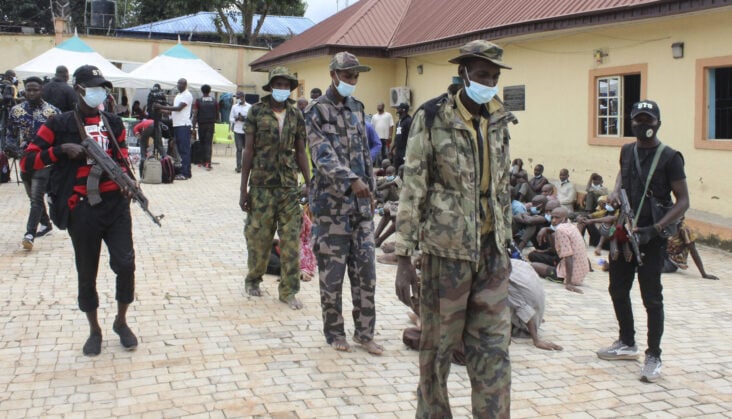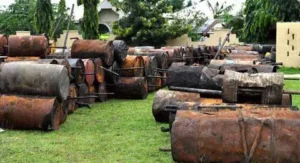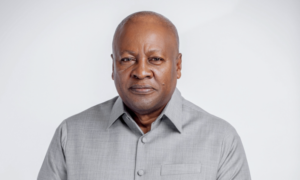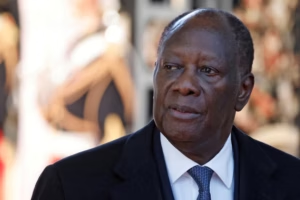
Source: The Africa Report
Gunmen kidnapped at least 3,620 people across Nigeria between July 2022 and June 2023 with a ransom demand totalling over N5bn ($6.5m), according to a new report by the research firm, SBM Intelligence.
Of the sum demanded as ransom, only N302m ($395,000) was paid to the kidnappers, the report added, quoting ransom payments disclosed by victims and family members.
“We believe these numbers could be far higher,†the report, which will be made public on 23 August, stated.
“This is because victims’ families and the police often choose not to state whether or not a ransom was paid to procure the release of the abducted, and in the few cases when ransom payments are acknowledged, the fees are hardly disclosed.â€
In-kind payments
Nigeria has continued to battle insecurity for over a decade. From the Boko Haram terrorists in the northeast, the violence has spread to Islamic State West Africa Province (ISWAP) and bandit attacks in the northwest; farmers and herders clashes in the north-central; and killings by criminal separatists in the southeast.
In the past decade, nearly 20,000 Nigerians were kidnapped in 2,694 separate abduction incidents, according to the Nigeria Security Tracker.
As Nigerians face severe economic hardship, including food shortage, the kidnappers are also extending their ransom demand to include in-kind payments.
According to the SBM report, there were 12 such in-kind payments in the period under review, with the dominant demand being food, followed by motorcycles. There were also demands for phone recharge cards, as was the case of Isiaka Dogara, an Abuja-based cattle dealer, and his daughter, who delivered N15,000 worth of recharge cards after paying N3m to the kidnappers.
In December 2022, when gunmen abducted 16 wedding guests in Abuja, Nigeria’s capital, they demanded bags of rice, spaghetti, drugs, and wine worth N437,000.
The report said all but one of the in-kind demands happened in the northern part of the country; in the one incident in Oyo, southwest Nigeria, where the kidnappers got two loaves of bread, two packs of cigarettes, and a carton of beer among others, in addition to the N5m ransom paid out of the N100m demanded.
Analysts say as the economic situation continues to worsen, the kidnappers are devising other means of getting ransom from their victims.
Medium of exchange
“Kidnappers have been able to survive varying government programmes targeted at them,†Confidence MacHarry, SBM Intelligence’s senior analyst, tells The Africa Report.
“During the cash crisis, they preferred in-kind payments, especially for specific targets. The medium of exchange included gold and diamonds. As things get worse, random kidnap victims would likely be required to give up more food items as ransom.â€
As their activities continue to go largely unchecked, the kidnappers have become bolder, the SBM report says. They have moved from abducting Catholic priests on the roads to taking them during church services.Â
An SBM Intelligence report earlier this year stated that the ransom demand for Catholic priests was set at an average of N50m.
But according to the report, it is no longer possible to know the ransom paid for priests because the Church has stopped announcing if the kidnappers of their clergymen have made ransom demands.
The report noted that the Church’s decision could be driven by the concern that disclosing such details might raise the vulnerability of the priests to further attacks.
State-by-state review
In the period under review, the report stated that kidnappers demanded N5.092bn as ransom payments but got only N302m.
A state-by-state review of the report shows that kidnappers in Edo, south-south Nigeria are more likely to demand higher ransoms than in other states. They, however, get little in return – of the N650m they demanded, they received N5m.
In contrast, Taraba, northeast Nigeria, paid the highest, delivering N60m of the N130m ransom demanded.
Furthermore, kidnappers appear more likely to get better ransoms in the north-central region than in other parts of the country. In Nasarawa, for instance, they narrowed their targets to high-value individuals such as retired government officials and family members of politically exposed persons.
The lowest ransom payments were paid in the south-south region and the report attributed that to either better police rescue operations or kidnap victims keeping a tight lip.



